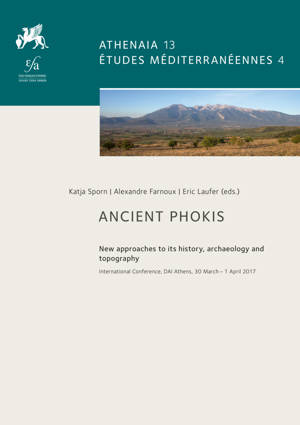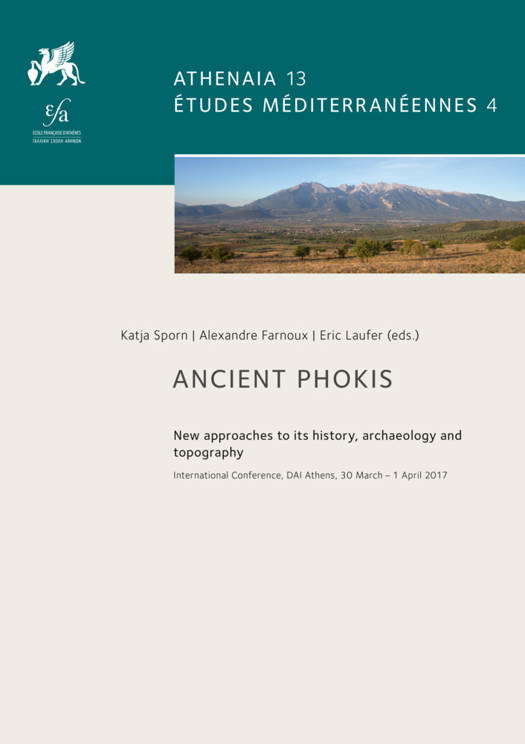
En raison d'une grêve chez bpost, votre commande pourrait être retardée. Vous avez besoin d’un livre rapidement ? Nos magasins vous accueillent à bras ouverts !
- Retrait gratuit dans votre magasin Club
- 7.000.000 titres dans notre catalogue
- Payer en toute sécurité
- Toujours un magasin près de chez vous
En raison de la grêve chez bpost, votre commande pourrait être retardée. Vous avez besoin d’un livre rapidement ? Nos magasins vous accueillent à bras ouverts !
- Retrait gratuit dans votre magasin Club
- 7.000.0000 titres dans notre catalogue
- Payer en toute sécurité
- Toujours un magasin près de chez vous
Ancient Phokis
New Approaches to Its History, Archaeology and Topography. International Conference, Dai Athens, 30 March-1 April 2017
144,45 €
+ 288 points
Description
English summary: This volume of the International Conference held in Athens in 2017, jointly organised by the German Archaeological Institute and the Ecole Francaise d'Athenes, brings together for the first time a cross-section of current research on ancient Phokis. As a region in the heart of ancient Greece, Phokis was of central importance for transport and travel. Politically and culturally, it was therefore often exposed to the interests and influences of neighbouring powers. A considerable number of mostly small poleis shaped the political landscape. In Delphi and Abai (Kalapodi), two oracles exercised an early impact far beyond the borders of the country. A substantial amount of recent fieldwork has contributed significantly to expanding our picture of ancient Phokis. The 32 papers collected in this volume cover the time span from the Iron Age to the Early Byzantine period. They address topics ranging from historical issues to settlement archaeology, sacred topography, material culture and the architectural design of the sanctuaries; from analyses of individual matters and broad material genres, to enquiries into aspects of a particular Phokian identity. Thus, for the first time, a broad overview of the previous research tradition, desiderata, and new perspectives for future research into ancient Phokis is provided. German description: Der Band der 2017 in Athen abgehaltenen internationalen Tagung, die gemeinsam vom Deutschen Archaologischen Institut und der Ecole Francaise d'Athenes organisiert wurde, versammelt erstmals einen Querschnitt der aktuellen Forschung zum antiken Phokis. Als Region im Herzen des antiken Griechenlands war Phokis von zentraler Bedeutung fur Verkehr und Reisen. Politisch und kulturell war sie daher haufig den Interessen und Einflussen der Nachbarmachte ausgesetzt. Eine betrachtliche Anzahl von meist kleinen Poleis pragte die politische Landschaft. In Delphi und Abai (Kalapodi) wirkten zwei Orakel schon fruh weit uber die Grenzen des Landes hinaus. Eine betrachtliche Anzahl neuerer Feldforschungen hat wesentlich dazu beigetragen, unser Bild vom antiken Phokis zu erweitern. Die 32 in diesem Band versammelten Beitrage decken die Zeitspanne von der Eisenzeit bis zur fruhbyzantinischen Periode ab. Sie befassen sich mit Themen, die von historischen Fragen uber Siedlungsarchaologie, sakrale Topographie, materielle Kultur und die architektonische Gestaltung der Heiligtumer bis hin zu Analysen einzelner Gegenstande und breiter Materialgattungen sowie Untersuchungen zu Aspekten einer besonderen "phokischen" Identitat reichen. Damit wird erstmals ein breiter Uberblick uber die bisherige Forschungstradition, Desiderate und neue Perspektiven fur die zukunftige Erforschung des antiken Phokis gegeben.
Spécifications
Parties prenantes
- Editeur:
Contenu
- Nombre de pages :
- 536
- Langue:
- Anglais
- Collection :
- Tome:
- n° 13
Caractéristiques
- EAN:
- 9783752008258
- Date de parution :
- 06-06-24
- Format:
- Livre broché
- Format numérique:
- Trade paperback (VS)
- Dimensions :
- 210 mm x 33 mm
- Poids :
- 925 g

Les avis
Nous publions uniquement les avis qui respectent les conditions requises. Consultez nos conditions pour les avis.





